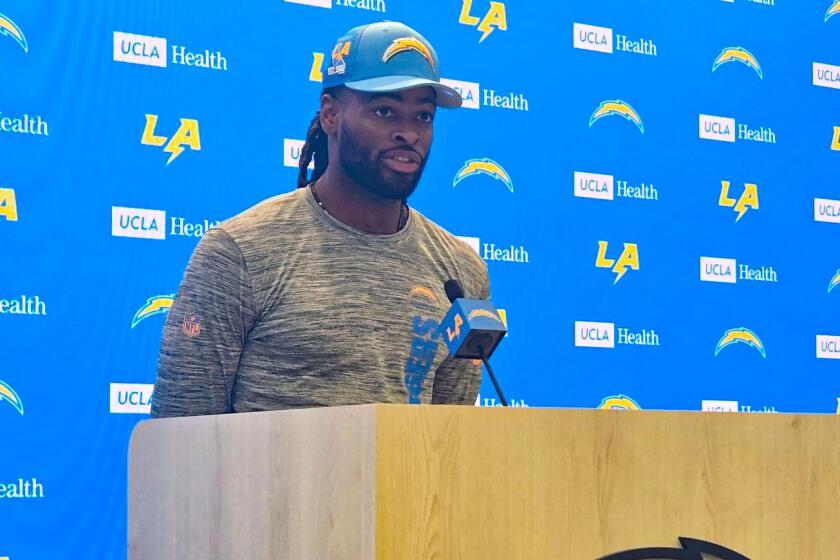Rugby Final Is a World Away
- Share via
This may have escaped your notice, but early Saturday morning, the third biggest sporting event in the world -- the Rugby World Cup -- will reach its glorious zenith. It will have been witnessed by 3 billion people in 29 countries, according to the event organizers, including the 83,500 at Telstra Stadium in Sydney, Australia.
Among that throng watching England and Australia square off will be 30,000 Englishmen. If their team is winning, the chorus of an ancient African-American spiritual will echo around the stadium.
“Swing low, sweet chariot; Comin’ forth to carry me home; Swing low, sweet chariot; Comin’ forth to carry me home.”
It will be sung with passion and not a drop of irony.
Not to be outdone, and three hours earlier, Australian radio stations will play, simultaneously, “Waltzing Matilda.” It gives away nothing of the imprint of the song on the Australian psyche to say that it is about a theft, apprehension and suicide, and was written during a national depression and labor strike in 1890. The Australian Rugby Union has asked every Australian who sings with, or simply listens to, “Waltzing Matilda” to face in the direction of the stadium when they do so. This was in response to an edict by the International Rugby Board that the song could not be sung before Australian matches, as it was not the national anthem. This affront set off a debate in the state parliament of New South Wales.
This lunatic, nationwide outbreak of fandom took off last weekend, when Australia defeated New Zealand’s favored All Blacks to reach the final.
Australians who had resigned themselves to being gracious hosts, rather than eager participants, went over the top, as can happen there in the context of sport. Especially when the rival team is England, Australia’s despised colonial parent.
Rugby and its attendant culture of singing and drinking is a taste that America has been slow to acquire. Only the Olympics and soccer’s World Cup are more popular globally than the rugby championships.
At first glance, the sport has a passing resemblance to gridiron football in the sense of the size of the participants and the mayhem inflicted, the main difference being that the ball has to be passed backward for a team to advance. The game’s supporters will say that the difference between rugby and football is the difference between chess and checkers. The neutral observer would wonder at a sport that has 92 separate laws governing a single aspect of play, the line-out, which is how the game is restarted after the ball is kicked out of bounds.
Rugby turned professional in 1995, a reaction to a threatened split within the sport as Rupert Murdoch lavished tens of millions of dollars for broadcasting rights. The U.S. missed that gravy train, and the sport here, played at the college and club level, remains largely amateur.
Unlike the 2000 Summer Olympics, the last big sporting event from Australia, the World Cup, held every four years and last won by Australia, has been a TV orphan in America. The U.S. broadcasting rights are held by Setanta, an English satellite company. The cost for any bar wanting to access the signal for the five-week duration of the Cup was $100,000.
Three Los Angeles-area bars -- in Van Nuys, Santa Monica and Costa Mesa -- decided to take the risk in order to show the games live, usually between 9 p.m. and 3 a.m. The World Cup semifinals and final have also been made available on pay per view, at $25.
So it was that at 6 a.m. one Friday last month, a group of devotees sat down at the Springbok Bar in Van Nuys; Australians, South Africans and a lone, displaced Englishman, to watch the opening match of the tournament between Australia and Argentina. One of the Australians carried his baby son with him. During a break in the play, he had his picture taken, holding his son in front of the big screen; there, but not quite there.
More to Read
Go beyond the scoreboard
Get the latest on L.A.'s teams in the daily Sports Report newsletter.
You may occasionally receive promotional content from the Los Angeles Times.










